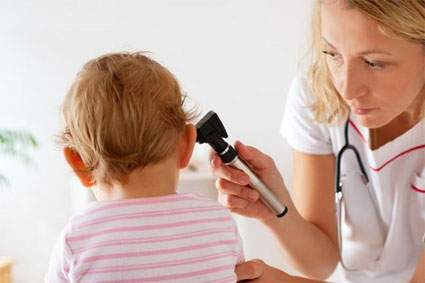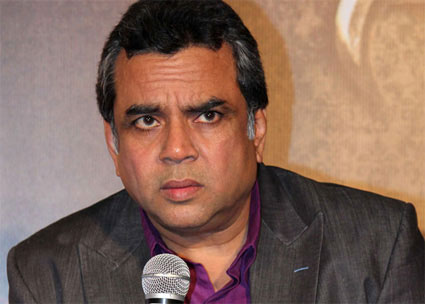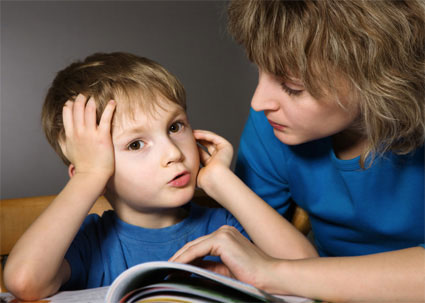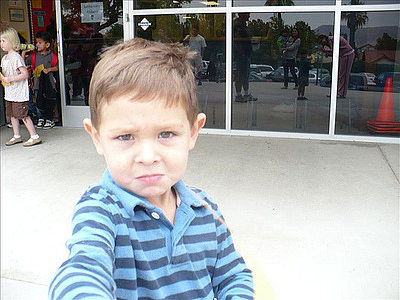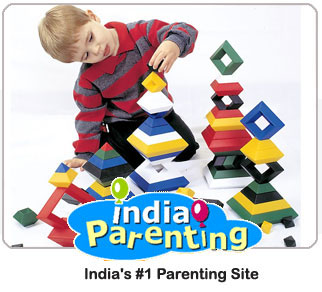By Dr. Kalyani Mandke (Consultant Audiologist, Pune)
Hearing loss can be cured with early intervention. If you want to know the symptoms of hearing loss in child and what you need to do after observing these symptoms, read on. You will also find about the different types of hearing tests.Mrinal is eight years old sweet girl, studying in the third grade. Mrinal has been having hearing problem for last five years. Her parents consulted the ear specialist and the doctor said a surgery can be done to cure her hearing problem.
Jitendra 12 year old boy developed hearing loss following high fever. His family has been consulting various doctors and everybody is saying nothing can be done. His hearing loss is of permanent type.
Charulata a four year old has been having frequent ear infections. She has been on medical treatment, Charulata hears well when her ears are free from infection, and her hearing is very bad, when she gets bad ear infection, she does not respond when called. Her parents are concerned about her inconsistent hearing response.
Rehman’s hearing loss was suspected at the age of nine months, and doctors told the family, nothing can be done. Rehman will be a hearing impaired child, so now focus should be on how he would speak, and how would he attend the normal school. But his parents have not understood why it is so that Rehman’s hearing can not be cured? Even, when his hearing loss is identified at such an early age, his grand parents are saying that as, the child grows his hearing will improve.
We need to understand that there are certain ear conditions those can be treated medically and there are some conditions, which cannot be treated medically or surgically. How do we know which ear defects are treatable and which are not?
Hearing loss may develop due to various defects in the ear. The defect may be in the outer ear, or in the middle ear, or in the inner ear. This hearing loss may be of mild, moderate or severe type. If the defect is in the middle ear child may complain about earache, ear blockage and/or he may have ear discharge. Such conditions are treatable with medical and/or surgical intervention. These defects may give temporary hearing loss. Once the medical intervention is done child would be alright. Children who are more prone for upper respiratory infections often have middle ear infections. Such children’s hearing levels need to be monitored closely.
Hearing loss which are due to inner ear defect are often permanent type. Depending upon the age of onset of hearing loss, it would have adverse effects on language development as well as scholastic performance. Such type of hearing loss may be since birth or it may be associated with some illness.
When do we have our child’s hearing test done? Hearing test can be done in the first few days after his birth and anytime after that but if you suspect hearing problem then have a test done immediately. Child’s behavior often indicates possibility of hearing loss.
How do You Suspect That Your Child has Hearing Loss?
Our hearing mechanism is functional right from the birth. So one month old baby, or a two year old toddler will certainly react to various sounds in the environment. We as parents need to observe their behavior and this behaviour may indicate that the child may have hearing loss.
The child of one year of age or above has good orientation about his environment. He knows what’s happening around him, like people are talking; mother is busy with some household job. Though child may not speak, or understand the details of the activity, child knows about movements, and actions. Child should respond to doorbell, telephone ring, whistle of a pressure cooker, mixer sound or even if somebody drops an object on the floor child should respond to such sounds.
By two year age child develops his language. Spontaneous expressive language is another strong indicator for normal hearing sensitivity. Observe the following.
A Child with Normal Hearing Should
- Identify his body parts, such as show me your eyes, and point to your nose.
- Responds to simple instructions, such as come here, clap your hands, close your eyes.
- Say simple sentences. E.g. give milk, want more, and pick (me) up.
- Imitate adult speech, especially child tries to imitate intonation pattern
- Have vocabulary size of 10-20 words.
If the child fails to understand simple commands, or if he uses too many gestures to communicate, then child should be referred for detailed audiological evaluation.
Gradually a child enters a school. Child with moderately severe to profound hearing loss can be identified by this age, as he would fail to acquire age appropriate language. But children with mild to moderate hearing loss are difficult to identify, and many times these defects go unnoticed up to age of five to six years of age. Let us try to understand the subtle behaviour of older age group children.
Behaviour Observations in Older Age
Following checklist may help the parents to identify hearing-impaired child. The symptoms are:
1) The child may speak too loudly or too softly.
2) He may put T.V. or radio at high volume.
3) The child may use lot of signs while speaking.
4) He may not like to play with other children of his group, as he can not actively participate in communication with his friends.
5) The child may be using only few words, and may not be able to speak meaning full sentences.
6) He may not respond if being called from the other room.
7) He may respond inconsistently and in appropriately.
8) The child may prefer lip reading (Speech reading) to listening. That means child prefers to talk face to face, and likes to look at the face of the speaker very closely while talking.
9) He may have faulty speech, like child may say tup for cup, old for cold. This kind of articulation errors lead to unintelligible speech. Only his immediate family members can understand him but not all.
10) The child may have difficulty paying attention for long time. He will not be able to do focus listening.
If such symptoms occur consistently, then it is advisable to refer this child for the formal hearing test.
There are various types of hearing tests. Some tests are screening tests, while other tests help to study the type and degree of a hearing loss in details.
The Hearing Tests
We have understood that hearing loss can be one ear or in both the ears, and it can be mild or can be profound as well. We need to have a tool to measure these hearing impairments. There are various types of hearing test. Hearing loss can develop at the age of ten years, fifty years, or as young as one day of age. Some children develop hearing loss prior to their birth.. There should be a test for every age. That’s why there are various tests; let us try to understand the utility of some of these tests. These all tests have a common aim to find out the hearing capacity.
Objectives of Hearing Tests
Why do we need to test one’s hearing? Can the doctor examine the ears and draw his conclusion? The fact is physical examination of
the ear only will give information of ear canal, ear drum, this examination gives information to the doctor whether person has normal ear drum or it has a perforation or some disease etc. Looking at the ear does not give any information about function of the ear. There is a need to test the sensory function of the ear and to draw a conclusion whether hearing is normal or abnormal. If the hearing mechanism is abnormal, then we need to know degree and type of hearing loss.
Types of Hearing Tests
There are two types of tests. These are
subjective hearing tests, and the
objective hearing tests. In subjective hearing test the person has to take part in the test. Person has to show whether he hears the sound or not. An adult can tell you by way of saying ‘ Yes, I heard the sound, or he may not say it, but indicate with action such as, he would raise the finger to indicate, yes I heard the sound.’ But for children it is very difficult to tell whether child has heard or not. Suppose we teach him to do some activity every time he hears the sound. e.g. child will drop a block in a bucket every time he hears the sound. That means the child will be asked to do certain activity (task) and his actions and response patterns will give some information to the tester. This information will facilitate the tester to draw a conclusion about the hearing status of that child. Such test is called
Pune Tone Audiometry. The report of the test is called
Audiogram. Audiogram is a graphical representation of hearing sensitivity of the ear. This is the most commonly done test, and this test gives sufficient information to plan the line of action. These actions can be medical intervention, or nonmedical (rehabilitative) intervention.
There are some occasion pure tone test can not be done, either the child is too young to undergo the test, or child is totally non cooperative to have a test, in such situations objective tests are recommended.
In objective tests the individual’s will not participate to say or to indicate whether he has heard the sound or not. That means child’s participation will be very minimal and the instrument will do the testing automatically. In the era of high tech computerization these tests are very effective and provide very valuable information about the hearing status in a short time. These tests are called as OAE- Otoacoustic Emission Test and another test is called as Auditory evoked Response (ABR) Test.
These tests are very reliable test and test results can provide sufficient information to plan an action.
The test can be subjective test or objective test, but the crust is if you suspect hearing loss in your child, have a hearing test done.












